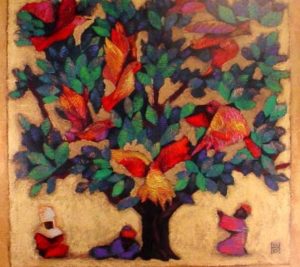Thoughts on Sunday’s Lessons for Oct. 6, 2019
First Reading (Track One): Lamentations 1:1-6
Cries of suffering and lamentation echo through Sunday’s readings, confronting us with some disturbing metaphors and images that we may find difficult to consider, even in words attributed to Jesus.
Perhaps our lesson this week is not to bottle up sad, hurt and angry feelings but to meditate on how we can use them to learn and grow. Our Track One first reading comes from Lamentations, a short book that was probably written in exile in Babylon. These verses poetically imagine the ruins of Jerusalem as a weeping woman sadly remembering happier times. Her princes are weak, her children captive. Her foes have won. Her enemies prosper and she fears that God brought this suffering on the people because of her wrongdoing.
First Reading (Track Two): Habakkuk 1:1-4; 2:1-4
Does Habbakuk’s name sound familiar? If not, that may be because this Track Two first reading is his only appearance in the entire three-year Lectionary cycle of Sunday readings. Habbakuk lived nearly 700 years before Jesus and, like many of the prophets, warned of the destruction and exile of Jerusalem. But this is a prophet with a difference. Unlike most of the prophets who hear God’s word and carry it on to humanity at God’s command, Habbakuk shouts his own warnings, then complains that even God doesn’t seem to be paying attention. God then instructs the prophet: Write your prophecy down. Make it so plain that a runner passing by can read it without slowing down. Then be patient, be just, and wait for God.
Psalm (Track One): Lamentations 3:19-26
Perhaps to provide preachers the option of avoiding the horrifying verse of Psalm 137 (see below) in which the Israelites celebrate smashing the enemy’s children on rocks, the Lectionary offers another passage from Lamentations as a Psalm-like reading in the traditional two-line verse form of biblical Hebrew poetry. In these verses from the third chapter, the tone of deep sorrow continues at the beginning. But then the language turns from pain to hope, for God’s steadfast love is unceasing and God’s mercy never ends. God is good to those who wait in quiet patience.
Alternate Psalm (Track One): Psalm 137
This ancient hymn of lamentation over the destruction of Jerusalem places the Psalmist in exile, “by the rivers of Babylon,” weeping over the lost city and temple and, in words that remain a vivid part of the Passover Seder, vowing never to forget Jerusalem. The verses then turn dark and horrifying, though, and we’re likely to react with visceral shock at the idea of Judah’s warriors joyously smashing innocent babies on the rocks. What can we possibly gain from reading these awful verses? Perhaps we are meant to see ourselves at humanity’s worst moments, and recognize how badly we can behave when hurt and frustration tempt us to lash out in anger.
Psalm (Track Two): Psalm 37:1-10
Sunday’s Track Two psalm fits well with God’s response to Habakkuk’s in the First Reading. The Psalmist calls us to trust in God, continue living in hope even when things aren’t going well. When the world appears dark and it seems that evil surrounds us, the Psalmist reminds us, we can put our faith in God and wait for God with patience and confident trust. Don’t lash back or strike out in anger. These things only lead to evil. But wait patiently, follow God’s ways, and we’ll be rewarded.
Second Reading: 2 Timothy 1:1-14
Written decades after the death of Paul, this short pastoral letter fondly imagines the evangelist writing from prison to his beloved disciple Timothy. It likely came at a time around the end of the first century, when the young church was suffering persecution. In that context, it is not surprising that its themes remind us of the Lamentations readings and Psalm. Hold onto your faith, even when times are hard; rely on the grace of God given through Jesus.
Gospel: Luke 17:5-10
In Luke’s long account of Jesus and the disciples’ journey toward Jerusalem , Jesus seems to toss one challenge after another to them – and to us. Sunday’s Gospel is no exception, with its apparently casual assumption that Jesus’ follower would routinely load down a slave with heavy work but never invite the slave to sit down at the table, much less bother to thank the slave. Perhaps we can argue that slavery was routinely accepted in that era, but it still feels uncomfortable at best to hear these ideas from the mouth of Jesus. Perhaps we have to gloss over this difficulty and consider the text as another of Jesus’ attention-getting metaphors showing that it is not easy to follow him. Jesus calls us to be humble, vulnerable, and, metaphorically at least, as obedient as slaves when we are called to follow him.
What are “Track 1” and “Track 2”?
During the long green season after Pentecost, there are two tracks (or strands) each week for Old Testament readings. Within each track, there is a Psalm chosen to accompany the particular lesson.
The Revised Common Lectionary allows us to make use of either of these tracks, but once a track has been selected, it should be followed through to the end of the Pentecost season, rather than jumping back and forth between the two strands.
For more information from LectionaryPage.net, click here.

